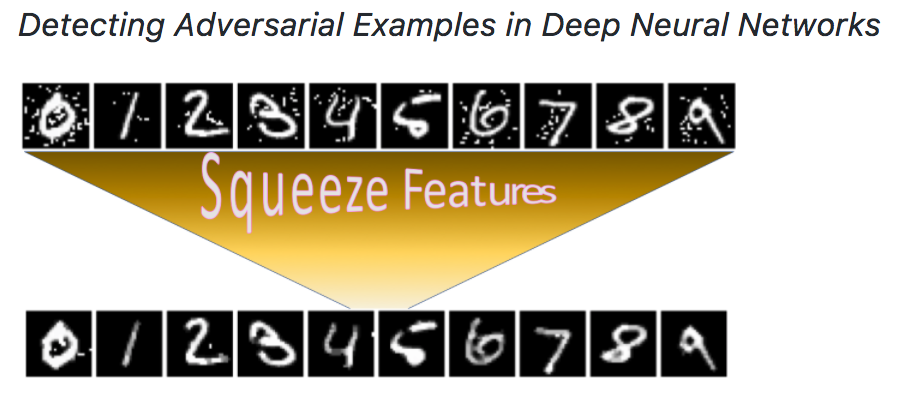NDSS - Feature Squeezing- Detecting Adversarial Examples in Deep Neural Networks
Paper Arxiv
GitHub: FeatureSqueezing
TalkSlide
Abstract
Although deep neural networks (DNNs) have achieved great success in many computer vision tasks, recent studies have shown they are vulnerable to adversarial examples. Such examples, typically generated by adding small but purposeful distortions, can frequently fool DNN models. Previous studies to defend against adversarial examples mostly focused on refining the DNN models. They have either shown limited success or suffer from the expensive computation. We propose a new strategy, \emph{feature squeezing}, that can be used to harden DNN models by detecting adversarial examples. Feature squeezing reduces the search space available to an adversary by coalescing samples that correspond to many different feature vectors in the original space into a single sample. By comparing a DNN model’s prediction on the original input with that on the squeezed input, feature squeezing detects adversarial examples with high accuracy and few false positives. This paper explores two instances of feature squeezing: reducing the color bit depth of each pixel and smoothing using a spatial filter. These strategies are straightforward, inexpensive, and complementary to defensive methods that operate on the underlying model, such as adversarial training.

Citations
@inproceedings{Xu0Q18,
author = {Weilin Xu and
David Evans and
Yanjun Qi},
title = {Feature Squeezing: Detecting Adversarial Examples in Deep Neural Networks},
booktitle = {25th Annual Network and Distributed System Security Symposium, {NDSS}
2018, San Diego, California, USA, February 18-21, 2018},
year = {2018},
crossref = {DBLP:conf/ndss/2018},
url = {http://wp.internetsociety.org/ndss/wp-content/uploads/sites/25/2018/02/ndss2018\_03A-4\_Xu\_paper.pdf},
timestamp = {Thu, 09 Aug 2018 10:57:16 +0200},
biburl = {https://dblp.org/rec/bib/conf/ndss/Xu0Q18},
bibsource = {dblp computer science bibliography, https://dblp.org}
}
Support or Contact
Having troubl with our tools? Please contact Weilin and we’ll help you sort it out.
